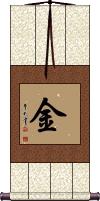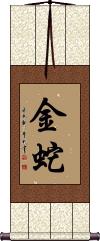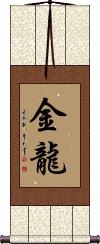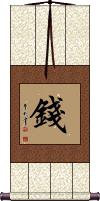Many custom options...
And formats...

Gold Metal in Chinese / Japanese...
Buy a Gold Metal calligraphy wall scroll here!
Personalize your custom “Gold Metal” project by clicking the button next to your favorite “Gold Metal” title below...
Gold / Metal
(One of the five elements)
金 is the symbol for metal (often means gold or money) in Chinese, Korean and Japanese.
In an interesting twist, in Japanese, this Kanji can also mean “Friday.” I guess Friday is “the golden day” in Japan.
Gold / Metal is one of the five elements that ancient Chinese believed all things were composed of. These elements are also part of the cycle of Chinese astrology. Every person has both an animal sign, and one of the five elements according to the date of their birth. See also Five Elements and Chinese 12 Animals / Zodiac.
Five Elements
金木水火土 is a list of the Chinese characters for the five elements in a comfortable order (meaning that they “feel right” to a Chinese person who views this arrangement).
The order is metal, wood, water, fire, and earth.
Note that sometimes the metal element is translated as gold. And earth refers to soil versus the whole planet earth.
Golden/Metal Snake
The Year of the Gold Snake
金蛇 is Golden/Metal Snake in Chinese.
In the Chinese zodiac and sexagenary (60-year) cycle, this combination occurs in years that include 1881, 1941, 2001, and 2061.
In the sexagenary cycle, this year is represented by 辛巳.
See Also: Snake
Golden Dragon
King
金 is how the name King is transliterated into Mandarin Chinese.
The meaning of this character is metal or gold, and it only vaguely sounds like “king”. But it was used in many articles for famous people like Larry King. If my last name was “King”, I would rather use the character 王 which means king, and romanizes as “wang” or “wong.”
Money
錢 is the simplest way to say “money” in Chinese.
It can also mean cash, coins, or currency. It's also a surname, Qian, in China.
![]() This also means coins in old Korean Hanja and Japanese Kanji (though they use a slightly alternate form in Japan, as seen to the right). In both Japan and Korea, this can simply mean “one cent.”
This also means coins in old Korean Hanja and Japanese Kanji (though they use a slightly alternate form in Japan, as seen to the right). In both Japan and Korea, this can simply mean “one cent.”
![]() On the left side of this character is a radical, which means “gold” (or metal, depending on context).
On the left side of this character is a radical, which means “gold” (or metal, depending on context).
![]()
![]() On the right are two repeated radicals which currently mean “small” or “narrow” but used to kind of mean “tools” or “weapons.”
On the right are two repeated radicals which currently mean “small” or “narrow” but used to kind of mean “tools” or “weapons.”
It's a bit of a stretch, but you could suggest that money = “gold weapons” or “gold tools” in Chinese. Many Chinese people would argue otherwise depending on what they know of or the way they understand the etymology of the right side radical. I've seen some who say it means “industrialized gold,” but I take that to mean “raw gold turned into coins.”
Words Have Enormous Weight: One Word Worth Nine Caldrons
一言九鼎 is an ancient Chinese proverb used in modern times to talk of profound or powerful words.
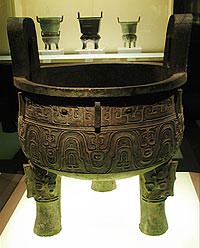 The literal meaning is “one word [worth] nine [sacred] tripods.” The tripod is a highly-prized three-legged (sometimes four-legged) metal pot or kettle of ancient China. They are often made of bronze, and the Emperor would have large ones gilded in gold. See the image to the right for an example.
The literal meaning is “one word [worth] nine [sacred] tripods.” The tripod is a highly-prized three-legged (sometimes four-legged) metal pot or kettle of ancient China. They are often made of bronze, and the Emperor would have large ones gilded in gold. See the image to the right for an example.
This in-stock artwork might be what you are looking for, and ships right away...
Beautiful Blue and Gold Chinese Birds & Flowers Painting
Discounted Blemished
Gallery Price: $71.00
Your Price: $39.00
Gallery Price: $101.00
Your Price: $55.88
Gallery Price: $63.00
Your Price: $34.88
Gallery Price: $63.00
Your Price: $34.88
Gallery Price: $72.00
Your Price: $39.88
Gallery Price: $63.00
Your Price: $34.88
Gallery Price: $72.00
Your Price: $39.88
Gallery Price: $50.00
Your Price: $29.88
Gallery Price: $101.00
Your Price: $55.88
Gallery Price: $50.00
Your Price: $29.88
Gallery Price: $72.00
Your Price: $39.88
Gallery Price: $101.00
Your Price: $55.88
Gallery Price: $101.00
Your Price: $55.88
Gallery Price: $101.00
Your Price: $55.88
Gallery Price: $101.00
Your Price: $55.88
Not the results for gold metal that you were looking for?
Below are some entries from our dictionary that may match your gold metal search...
| Characters If shown, 2nd row is Simp. Chinese |
Pronunciation Romanization |
Simple Dictionary Definition |
金 see styles |
jīn jin1 chin kin きん |
More info & calligraphy: Gold / Metal(1) gold (metal); (2) (See 金色) gold (color); (3) gold (medal); first place (prize); (noun - becomes adjective with の) (4) something of great value; something golden (e.g. silence); (5) money; gold coin; (6) (written before an amount of money) sum (of money); (7) (abbreviation) (See 金曜) Friday; (n,ctr) (8) karat (measure of purity of gold); carat; (9) (See 五行・1) metal (fourth phase of Wu Xing); (10) (hist) Jin dynasty (of China; 1115-1234); Chin dynasty; Jurchen dynasty; (11) (abbreviation) {shogi} (See 金将) gold general; (12) (abbreviation) (colloquialism) (See 金玉) testicles; (surname) Kimu; Kim hiraṇya, 伊爛拏 which means cold, any precious metal, semen, etc.; or 蘇伐刺 suvarṇa, which means "of a good or beautiful colour", "golden", "yellow", "gold", "a gold coin", etc. The Chinese means metal, gold, money. |
箔 see styles |
bó bo2 po haku はく |
plaited matting (of rushes, bamboo etc); silkworm basket; metal foil; foil paper (1) foil; (gold, etc.) leaf; (2) prestige |
五金 see styles |
wǔ jīn wu3 jin1 wu chin |
metal hardware (nuts and bolts); the five metals: gold, silver, copper, iron, tin 金銀銅鐵錫|金银铜铁锡[jin1 yin2 tong2 tie3 xi1] |
四輪 四轮 see styles |
sì lún si4 lun2 ssu lun yonrin よんりん |
(can be adjective with の) four-wheeled The four wheels or circles: (1) 大地四輪 the four on which the earth rests, wind (or air), water, metal, and space. (2) Four images with wheels, yellow associated with metal or gold, white with water, red with fire, and black with wind. (3) The four dhyāni-buddhas, 金剛輪 Akṣobhya; 寳輪 Ratnasaṃbhava; 法輪 Amitābha; 羯磨輪 Amoghasiddhi. (4) Also the four metals, gold, silver, copper, iron, of the cakravartin kings. |
生像 see styles |
shēng xiàng sheng1 xiang4 sheng hsiang shōzō |
生似 Natural and similar, i. e. gold and silver, gold being the natural and perfect metal and colour; silver being next, though it will tarnish; the two are also called 生色 and 可染, i. e. the proper natural (unchanging) colour, and the tarnishable. |
蒔絵 see styles |
makie まきえ |
gold or silver lacquer; lacquer decoration sprinkled with metal powder; (female given name) Makie |
金人 see styles |
jīn rén jin1 ren2 chin jen kon nin |
Buddha; an image of Buddha of metal or gold, also 金佛. |
金偏 see styles |
kanehen かねへん |
(1) kanji "metal" or "gold" radical at left; (2) the metal industry |
金山 see styles |
jīn shān jin1 shan1 chin shan kinzan きんざん |
Jinshan suburban district of Shanghai; Jinshan or Chinshan township in New Taipei City 新北市[Xin1 bei3 shi4], Taiwan (See 金山・かなやま) gold mine; (place-name) Kinzan Metal or golden mountain, i.e. Buddha, or the Buddha's body. |
金性 see styles |
kinshou / kinsho きんしょう |
(1) purity measure for gold; karat; carat; K; kt; (2) (See 金・きん・9) personality of a person born under the element of metal |
金輪 金轮 see styles |
jīn lún jin1 lun2 chin lun konrin こんりん |
(1) {Buddh} gold wheel (highest of the three layered wheels that support the earth above the primordial void); (2) (abbreviation) {Buddh} (See 金輪王) gold wheel-turning sage king; (place-name, surname) Kanawa The metal circle on which the earth rests, above the water circle which is above the wind (or air) circle which rests on space. Also the cakra, wheel or disc, emblem of sovereignty, one of the seven precious possessions of a king. |
鍊金 see styles |
liàn jīn lian4 jin1 lien chin renkon |
to forge [smelt] gold [or metal] |
黃金 黄金 see styles |
huáng jīn huang2 jin1 huang chin ōgon |
gold; golden (opportunity); prime (time) The yellow metal, i.e. gold. |
點金成鐵 点金成铁 see styles |
diǎn jīn chéng tiě dian3 jin1 cheng2 tie3 tien chin ch`eng t`ieh tien chin cheng tieh |
to transform gold into base metal (idiom); fig. to edit sb else's beautiful prose and ruin it |
斫迦羅伐辣底 斫迦罗伐辣底 see styles |
zhuó jiā luó fá là dǐ zhuo2 jia1 luo2 fa2 la4 di3 cho chia lo fa la ti shakarabaratei* |
遮迦越羅; 轉輪王 Cakravartī-rāja, sovereign ruler, whose chariot wheels roll everywhere without hindrance: the extent of his realm and power are indicated by the quality of the metal, iron, copper, silver, or, for universality, gold. The highest cakravartī uses the wheel or thunder-bolt as a weapon and 'hurls his Tchakra into the midst of his enemies', but the Buddha 'meekly turns the wheel of doctrine and conquers every universe by his teaching'. |
Variations: |
makie まきえ |
gold or silver lacquer; lacquer decoration sprinkled with metal powder |
Variations: |
kanehen かねへん |
(1) kanji "metal" or "gold" radical at left; (2) the metal industry |
The following table may be helpful for those studying Chinese or Japanese...
| Title | Characters | Romaji (Romanized Japanese) | Various forms of Romanized Chinese | |
| Gold Metal | 金 | kin | jīn / jin1 / jin | chin |
| Five Elements | 金木水火土 | jīn mù shuǐ huǒ tǔ jin1 mu4 shui3 huo3 tu3 jin mu shui huo tu jinmushuihuotu | chin mu shui huo t`u chinmushuihuotu chin mu shui huo tu |
|
| Golden/Metal Snake | 金蛇 | jīn shé / jin1 she2 / jin she / jinshe | chin she / chinshe | |
| Golden Dragon | 金龍 金龙 | kin ryuu / kinryuu / kin ryu | jīn lóng / jin1 long2 / jin long / jinlong | chin lung / chinlung |
| King | 金 | jīn / jin1 / jin | chin | |
| Money | 錢 / 銭 钱 | sen | qián / qian2 / qian | ch`ien / chien |
| Words Have Enormous Weight: One Word Worth Nine Caldrons | 一言九鼎 | yī yán jiǔ dǐng yi1 yan2 jiu3 ding3 yi yan jiu ding yiyanjiuding | i yen chiu ting iyenchiuting |
|
| In some entries above you will see that characters have different versions above and below a line. In these cases, the characters above the line are Traditional Chinese, while the ones below are Simplified Chinese. | ||||
Successful Chinese Character and Japanese Kanji calligraphy searches within the last few hours...
